With Richard Utz, Interim Dean of the Ivan Allen College of Liberal Arts
Values, Principles, Agency
In 1963, our College’s namesake, Atlanta Mayor Ivan Allen Jr., testified before Congress in favor of Civil Rights legislation at considerable risk to his career and reputation. And María Marina Machado, the Venezuelan opposition leader whom Georgia Tech honored with the Ivan Allen Jr. Prize for Social Courage two weeks ago, continues to fight for justice in her country despite the threat of imprisonment and attempts to kill her. Based on these two examples of courageous human beings with whom we publicly associate, I invite us to consider: What might it mean for a person working in higher education to show courage at a moment laden with political, economic, and strategic uncertainty? Perhaps as little as doing what we have been hired to do?
Our College Strategic Plan contains values, including critical thinking, equity, and social courage, that we all agreed would guide us, especially during difficult times. Our Institute Strategic Plan, developed by all of us and approved by our leadership and the University System of Georgia, encourages us to “strive for excellence,” “thrive on diversity,” and “act ethically,” among other essential principles. To the best of my knowledge, none of these values and principles has suddenly become obsolete or illegal. In fact, I am convinced these principles and values are more important now than when we adopted them.
Based on these core values and principles, then, I hope that we would simply do what we know how to do: Do our economists understand the impact of trade protectionism and deregulation? Do folks in International Affairs study the virtues of diplomacy and international partnerships? Do our colleagues in Modern Languages understand the value of multilingualism and language study for the future of global interactions? Do our colleagues in History and Sociology know about models to explain various iterations of government and society? Do our friends in Public Policy have the wherewithal to point out the dangers of situational ethics and to predict the future role of sustainability and health care policy? Do our colleagues in Literature, Media, and Communication have the tools to analyze the infodemic unleashed via transnational social media? Do our researchers in the Center for Advanced Communications Policy employ user testing and human factors analysis to help us understand the needs of people with disabilities, the aging, and other vulnerable populations? And can our experts in Writing and Communication analyze the written, oral, visual, electronic, and non-verbal signals involved in current interviews, debates, and media coverage?
If the answer to these and similar questions is “Yes,” I suggest we use our agency as educators and our substantial intellectual resources to accompany and shape the present moment. Whatever we may do outside our academic lives — as community organizers, members of a faith community, or political activists — as academics, our primary purpose is to use the tools of our professional trades to offer science-based critical analysis for everything happening around us, and to share our ideas far and wide. This moment is testing us, and failing this test is not an option. I welcome everyone’s insights on how we can best move forward, and I will continue to champion our teaching, research, scholarship, and service, all activities inspired by our shared values and principles.
March 5, 2025
Jimmy Carter: Engineer, President, Poet

As the eulogies were popping up on my smart phone on and after Dec. 29, 2024, I was stunned by the many domains with which President Jimmy Carter engaged during his lifetime. Naturally, there was much focus on his national and international activities as 39th president: energy policy, Middle East peace, diplomacy, human rights, education, and environmental conservation. Related humanitarian and peace efforts (Carter Center, election monitoring, conflict resolution, health and disease eradication, combatting poverty) also took center stage among journalists’ narratives, closely followed by his community work (Habitat for Humanity), religious leadership (Sunday school teaching, interfaith dialogue), and military service (naval officer). And there was his impressive record as the author of 32 books on politics, human rights, aging, faith, peace, family history, and other topics.
Various formal educational experiences, mostly in engineering, math, and physics, but interspersed with core courses in the humanities, at Georgia Southwestern College, Georgia Tech, and the U.S. Naval Academy were only the beginning of a lifelong desire to learn and grow. Simply put, Carter aimed for breadth or, rather, range, which is also the title of a brilliant 2021 book by David Epstein. Epstein argues in Range that those of us who explore multiple domains and develop varied skills are often better prepared to solve complex problems and excel in unpredictable environments than specialists with a narrow focus on one subject. Not unlike Roger Federer, Charles Darwin, Francis Crick, Gunpei Yokoi, Vincent Van Gogh, Igor Stravinsky, Jeff Bezos, Winston Churchill, and Harriet Tubman, all of whom Epstein adduces as ‘late specializers’ or jack-of-all-trades innovators, artists, athletes, scientists, leaders, and entrepreneurs, Carter never stopped acquiring new skills and kinds of knowledge. He was never afraid of becoming, time and time again, an amateur, a dilettante, or an enthusiast, all terms denoting the pleasure of continually and earnestly learning new things from scratch, without making them one’s profession.
One of these adventures into the pleasure of reconfiguring his life within ever-new activities and diverse forms of expression led Carter to writing poetry. He had a lifelong appreciation for enjoying poetry ever since elementary and high school, and he himself published an entire volume, Always a Reckoning and Other Poems, in1994. Like some of his autobiographical prose writings, the collection is full of personal memories about People, Places, Politics, and Private Lives, the four sections into which the 44 poems are divided. Ever humble about his writing craft, he sought advice from Arkansas poets Miller Williams and James Whitehead who, together with his family and friends, served as critics, mentors, and guides during the 1980s and early 1990s until he felt the volume was ready to publish.
In his poems, he remains true to the persona we know from his reflective prose writings: Each of the scenes or incidents reflects on an ethical dilemma. Wrestling with the racial dynamics of rural Georgia which he experienced as a boy, he learns many a helpful lesson from the friendly neighbor’s wife, but knows “that Rachel’s folks were brought … to be my people’s slaves” (“Rachel”). He reveals the transactional mindset of a local politician, who explains “The governor and state officials thank a county that will always go their way. That’s how the people get the roads and jobs” (“The County Boss Explains How It is”). And in “Life on a Killer Submarine,” he reflects on his and his fellow submariners cold war dilemma about dealing with enemy submarines:
We wanted them to understand
that we could always hear them first
and, knowing, be inclined to share
our love of solitude, our fear
that one move, threatening or wrong,
could cost us the peace we yearned to keep
and kill our hopes that they were thrilled like us
to hear the same whale’s song.
Jonathan Alter, who wrote a biography of Jimmy Carter as recently as 2020, said the 39th president was “the closest we’ve had to a Renaissance man in the presidency since Thomas Jefferson.” That’s borne out not only by the impressive range of his activities, but also by his poetry. Like the founders of Christian humanism during the Renaissance, he had two main goals with committing his thoughts to the page: becoming the best human being he could possibly be by honing the uniquely human gift of language, and telling stories that suggest that as humans we can distinguish right from wrong.
Carter’s “soft” skill as a poet offered him just another opportunity to reflect on and communicate the values that also inform his politics and policy: freedom and human dignity. As numerous responses on Amazon and Goodreads suggest, the first book of poetry by a U.S. president won over numerous readers who otherwise would not have opened the cover of a book of poems. Many of them indicate how reading the deceptively simple poems humanized and added a deeper layer of understanding to his decisions as a world leader. Just like the hundreds of Georgia Tech STEM students who flock to events at Poetry@Tech and attend classes in poetry, communication, modern languages, literary and cultural studies, history, and ethics every year, Carter understood and demonstrated that, in the words of Albert Einstein, STEM and the humanities really are “branches from the same tree.” Our students, just like the 39th U.S. President, understand that seeking a full range of core education, a holistic integration of STEM and the humanities, can lead to career success as well as a more fully ‘human’ life.
Jan. 8, 2025
Building Bridges
Two weeks ago, I had the opportunity to represent Georgia Tech and the Ivan Allen College at Times Higher Education’s inaugural Liberal Arts Summit, held this year at Vanderbilt University, a nice coincidence considering we are celebrating The Year of the Liberal Arts at our institution during this academic year. The charge for the 30+ invited speakers at the Summit was to discuss all aspects of liberal arts education and scholarship, with a specific focus on the liberal arts and innovation in the digital age, and the event featured national experts like Paula Krebs (Executive Director, Modern Language Association), Jon Meacham (Pulitzer Prize winning author, presidential historian, and Distinguished Professor at Vanderbilt), Marjory Hass (President, Council of Independent Colleges), and Lynn Pasquarella (President, American Association of Colleges and Universities).
The plenary workshop in which I participated focused on “Innovative Teaching Methods in Liberal Arts,” and our conversations revolved around dated dichotomies separating the STEM disciplines from the humanities (with the social sciences situated somewhere in the middle). Carlos Evia (Associate Dean for Transdisciplinary Initiatives and Chief Technology Officer in the College of Liberal Arts and Human Sciences at Virginia Tech), Aneta Sobotka (Times Higher Education), and I weighed the advantages and disadvantages of the liberal arts as “ancillary” to the lead disciplines on many campuses. We also advanced that attributing more institutional appreciation and value to teaching and educational innovation in higher education might open additional space and time for faculty to do the time-consuming work of socializing AI and other recent technologies and collaborative instruction. And we felt that traditional practices in higher education, those based on the systematic separation of scientific and non-scientific disciplines developed in the late nineteenth century, need to be replaced by more deliberately holistic models, those based on the quickly developing knowledge economy of the twenty-first century.
As Daniel Diermeyer, Vanderbilt University’s chancellor, summarized recently, “The liberal arts have as much to offer students and society as ever. What is more, the choice between them and technological fields is a false one. Already, technology is shaping liberal arts disciplines, and vice versa. But it is time for universities to build more bridges between the two and offer students a more integrated educational model.” I could not agree more: It is (draw)bridges between and among disciplines we need (lowered), not more disciplinary ditches, moats, and walls, and the Ivan Allen College has the intellectual foundations and collaborative habits to build more of those integrative bridges, together with our STEM partners.
Dec. 11, 2024
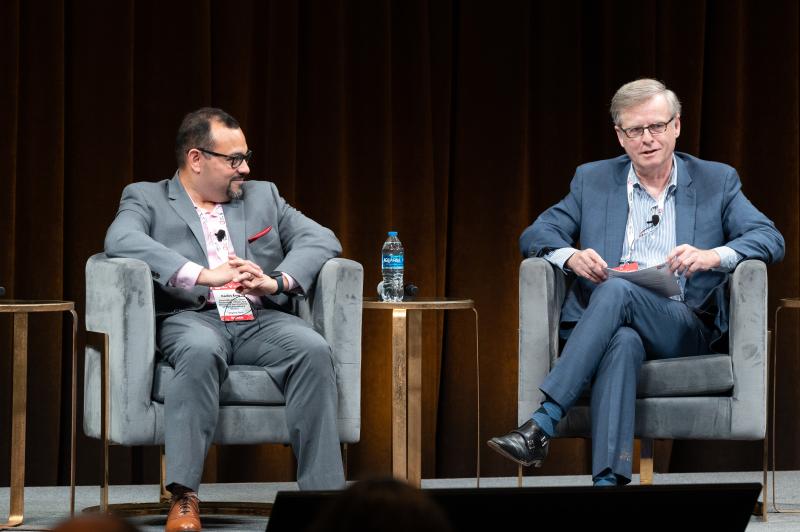
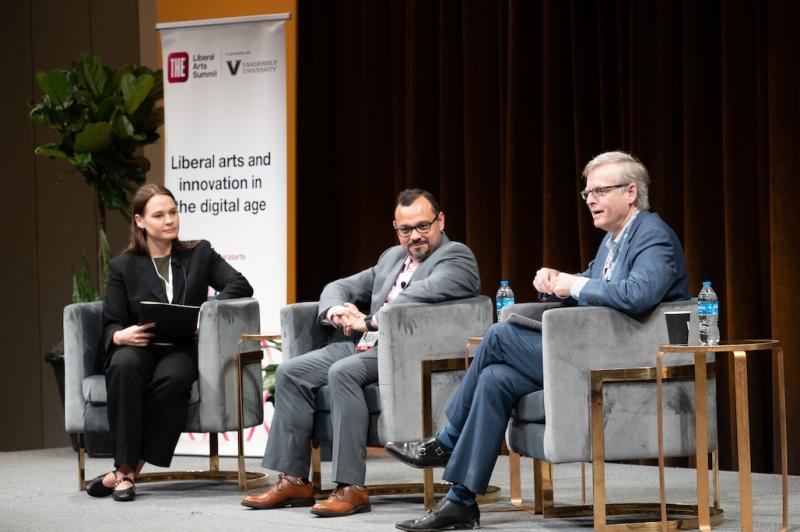
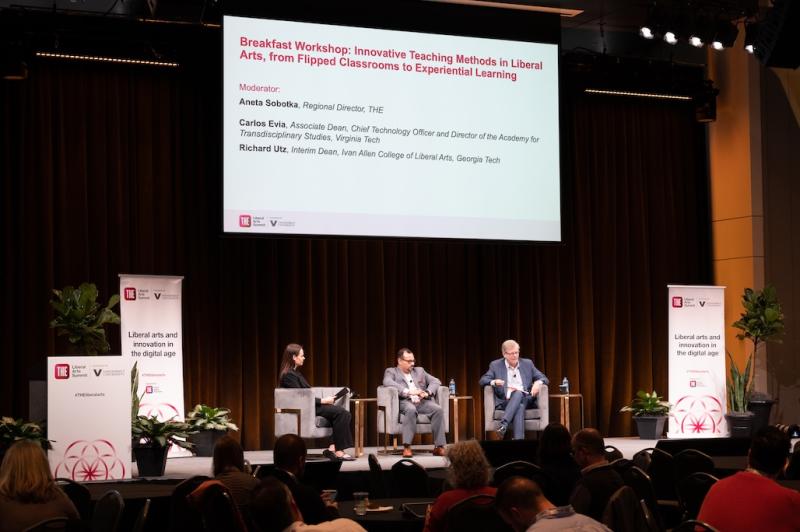
Suspicious Minds
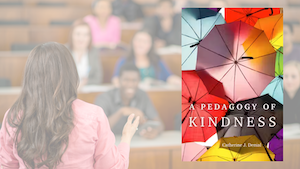
I continue to be attracted to books that combine the features of the manifesto, memoir, and professional advice. These kinds of books often offer authentic personal experience and practical solutions. Most recently, I thumbed through an example of the genre that focuses on the place of teaching and the role of care and compassion for students. In her introduction to A Pedagogy of Kindness (2019), author Catherine Denial doesn’t mince words about what is absent from the current priorities in higher education. “Academia is not, by and large, a kind place. The engine of higher ed is fueled by stories of individualism, competition, prestige, and distrust.” When it comes to our students, she adds, our academic culture is dominated by “a generalized suspicion of students — they’ll cheat; they won’t do the reading; they’ll never come to class.” This hermeneutics of suspicion has only intensified with the ever-accelerating use of artificial intelligence and our crazed efforts to detect it in assignments.
Originally socialized into an academia championing individual achievement, competition, and distrust, Catherine Denial wants us to consider replacing suspicion and distrust with “believing people, and believing in people,” and she celebrates kindness (which is not the same as “being nice”) as the missing element in U.S. education, an element that can help students develop intellectually and socio-emotionally. Based on her experience as a student, graduate assistant, and instructor at several institutions, she recommends we should be kind to ourselves as educators, craft helpfully kind syllabi, devise kind forms of assessment, and be kind in the classroom.
A Pedagogy of Kindness contains numerous recommendations, and Catherine Denial is way too smart to think that her readers will include all of them into their practices. However: Perhaps you find new explanations about why students don’t tell us about the real reasons for being late on an assignment; perhaps you may replace unattended office hours with lively group work sessions; or you may decide to elevate students from passive recipients of information to partners in the learning process. I know many of us are thinking about some these matters all the time, but the condensed manner and deep commitment with which A Pedagogy of Kindness addresses them is refreshing. As I was reading, it dawned on me that many of the recommendations create some of the same kinds of engagement we find successful in the teaching of Vertically Integrated Projects, flipped classrooms, integrated learning, and internships. However, the book’s goals are much more comprehensive, even if you can easily zoom through its 182 pages in about three hours.
If you agree that we shouldn’t go on together with suspicious minds, take a peek at A Pedagogy of Kindness. If you think more “rigor” is all we need in higher ed, prepare to have your convictions challenged.
Sept. 25, 2024
Making Students Our Top Priority
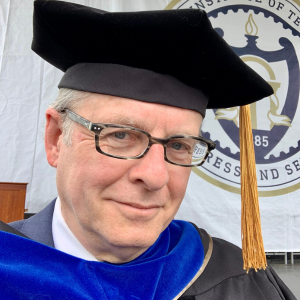
The values section of our institution’s Strategic Plan includes a statement that leaves no doubt about what is at the heart of our efforts: “We are educators first and foremost, committed to developing leaders who advance technology and improve the human condition. We measure our success by the achievements of our students and the impact of our graduates in improving the lives of others.” The clarity and positioning of this declaration is perhaps surprising at a top research university that employs just as about as many research faculty as academic faculty. However almost all our activities, by researchers and academic teachers, contribute to the quality of student learning and their success after graduation. Most recently, the decision to make Transformative Learning Experiences the focus of Georgia Tech’s Quality Enhancement Plan (as part of the institution’s reaccreditation) would also indicate that we mean business when it comes to putting our students first.
Of course, students first need to be able to join us to partake of the learning experience we work so hard to create, and that’s why “Expand Access” is a prime focus area in our institution’s Strategic Plan, too. One of the main obstacles to empowering as many students from as many backgrounds as possible is to make sure they see our institution as financially attainable. And a 2024 investigation, for which Georgia Tech collaborated with the American Association of Universities, reveals that a considerable number of Georgia citizens believes that someone from a family like theirs could simply not afford attending Georgia Tech. While we know that we in fact compare very well nationally in the area of affordability with institutions offering similar educational quality and reputation, it seems that the very populations for whom we seek to create additional pathways to attend Georgia Tech nevertheless perceive us as unaffordable. Whatever we find out as we dig deeper into these data, we know that additional support to students will be necessary to expand access.
At Ivan Allen College, making students our top priority and expanding access is not merely a performative act. We deliberately enact these strategic priorities by increasing the investment we make in new direct student support: In a first step, we joined Georgia Tech’s other colleges in a 3% increase for all graduate student stipends. In a second step, in addition to new faculty and staff hires and support for new programs initiatives, we are investing an unprecedented 35% of our total annual budget allocation in 17 new graduate student stipend lines, both at the master’s and doctoral levels. And we won’t stop there: Another focus for the academic year will be to substantially increase the number of scholarships available to undergraduate students.
Please join us in our effort to make an Ivan Allen College education attainable and affordable for as many students as possible! As a smart national leader once said: “Show me your budget, and I'll tell you what you value.”
Aug. 21, 2024
Our Names, Our Selves

Our Georgia Tech strategic plan states that “we thrive on diversity,” and many of us do our part to make sure this isn’t just a slogan. There is a small (perhaps not so small) adjustment we can make to create a more welcoming workplace.
No, I am not thinking about gender pronouns, although getting those right definitely demonstrates respect for another person’s preferred gender identity. I am thinking about names.
Our names are deeply personal, related to identity and heritage, but it’s amazing how often we get our coworkers’ or students’ names wrong, pronounce them only approximately right, or avoid saying someone’s name entirely because we feel embarrassed. Research reveals what those on the receiving end feel when their names are avoided or continually mispronounced and misspelled: “I am not important.” — “I am different.” — “I am not respected and valued.” And, as a consequence: “I don’t belong here.”
There are best practices about how to remedy this situation, and most actions only take seconds: Online resources offer pronunciation guides for names from around the world. If you feel comfortable enough, you can also simply ask your colleague or student about their preferred pronunciation. Those of us working in the science of names and naming (onomastics, specifically anthroponymy) know that human names are tricky when it comes to pronunciation. The normal rules of pronunciation don’t always apply. If you yourself have a name that might cause others difficulty, you can add a pronunciation guide in your email signature. And if you know how to pronounce someone else’s name correctly, but others don’t, you can help the situation by pronouncing it correctly so that others can hear and imitate.
Am I guilty of mispronouncing and misspelling others’ names? Absolutely. Living in a trilingual household doesn’t protect one from getting things wrong. Knowing this, I try to pay a little extra attention when a colleague’s last name happens to be “Fealing” (which autocorrect invariably turns into “Feeling”), wondered if Aaron Levine prefers to pronounce his last name “la-veen” or “lee-vine” (both exist, but he prefers “la-veen”), and loved to learn that Shatakshee (“shuh-taak-shee”) Dhongde’s first name is a blend of two Sanskrit words, “shata” and “akshi,” which translates into “hundred-eyed,” which comes in handy when she surveys the myriad details in the world of academic affairs. And finally, I wouldn’t want to call our president “Angel” (“AYN-juhl”) when he prefers the Spanish “Ángel” (which most English speakers approximate into “AHN-hehl”).
Getting each others’ names right takes only the smallest of efforts.
We are at Georgia Tech. We can do that.
July 24, 2024
